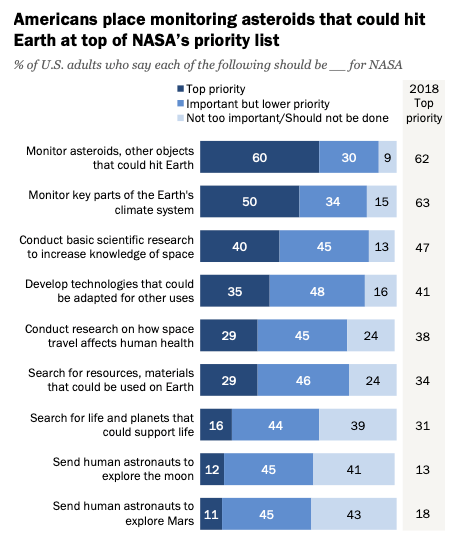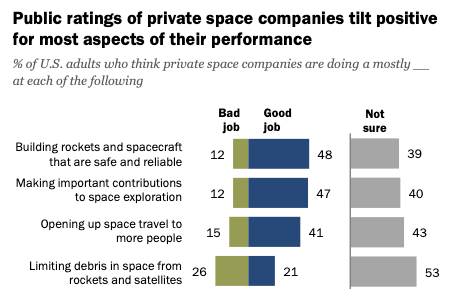A new survey has found that more than half of all Americans expect to be able to travel to space within five decades.
A new study from the Pew Research Center polled U.S. citizens to gauge what they expect of spaceflight over the next 50 years. The survey gathered general opinions on NASA’s continued role as a leader in space exploration, how the growing commercial space industry will increase access to space, and the topics people think should be the space agency’s top priorities.
The survey found that while over half of Americans expect space tourism to be routine by 2073, far fewer would be willing to take the trip themselves. 65% of those surveyed said they would not be willing to go to space if given the opportunity. That number is ten percent higher than the 55% who expect it to be widely available option.
Related: Do space tourists really understand the risk they’re taking?
The survey was conducted between May 30 and June 4 of this year, and polled over ten thousand individuals to see if attitudes about space travel have changed over the last five years. A similar survey was conducted by Pew in 2018. Since then, the number of Americans who think average citizens will be routinely traveling to space over the next half century has increased five percent.
Brian Kennedy authored the report with Alec Tyson and their team at Pew. They study public perception of different science and technology-related topics. “We thought this was an opportune time to kind of take a look at where the public stands on space-related issues after five years,” Kennedy told Space.com.
For context, 2018 is the year SpaceX launched the first Falcon Heavy rocket. The company’s total launches for that year reached a record breaking 21. NASA’s Space Launch System (SLS) rocket had faced development delays, but was on track for its first launch by mid-2020. Instead, SLS’s first launch took place last year (2022), on NASA’s Artemis 1 mission, and this year SpaceX is on course to complete 100 orbital launches.
“A lot has changed in the last five years,” Kennedy said, adding, “We have the increasing involvement of private companies, space tourism seemingly becoming more of a reality and also more countries involved in space. Countries like India and China.”
The Pew survey revealed 69% of Americans believe it is essential for the U.S. to remain an international leader in space exploration. But how that lead is maintained, and NASA’s role in that leadership, versus the part of the private space industry, is not as universally agreed upon.
In a question to rank NASA’s priorities, 60% of survey participants listed monitoring potentially dangerous asteroids as a top concern. Just below that, 50% ranked monitoring Earth’s climate as a high priority, essentially elevating the expectation for our planet’s protection and longevity into the space agency’s stewardship (if 50-60% of us had our way, at least).
Listed much further down the priority list, ranked in the two bottom spots, are the 11 and 12% of people who believe NASA should prioritize human exploration of Mars or the moon, respectively. For both celestial destinations, 45% see it as “important but lower priority,” with the remainder listing it as “not too important/should not be done.” Searching for aliens and life-sustaining planets ranked higher as a top NASA priority, with 16%.
“A lot of Americans, when it comes to sending astronauts to the moon and Mars, they kind of are right in the middle of those two categories: Either important or not a top priority, or not too important. A few Americans actually come out and say in the survey that this should not be done,” Kennedy said.

When it comes to the commercial side of the space industry, results were slightly more positive, though much more unsure. Public perception of private space companies, such as SpaceX, Blue Origin, or Virgin Galactic, is mostly positive for those familiar with the subject matter, but nearly 40% or higher responded they were too unfamiliar with the commercial space industry at all to be informed on the issues.
“Sizable shares are not sure,” Kennedy said. “They’re not sure of the performance of private space companies, and didn’t rank them in these aspects. So that just speaks to the American public. There’s a segment there that’s largely unfamiliar with these companies and what they’re doing.”
For those with even a cursory interest in the commercial space industry (if you’re reading this, you qualify), space companies got mostly good ratings. For building safe and reliable rockets and spacecraft, 48% think the private sector is doing a good job, and 47% think companies are making significant contributions to the space industry. 41% see the private space sector as a way for spaceflight to become accessible to more people.

There is doubt, however, in people’s perception that these companies are doing a good job limiting the amount of space debris being created in Earth’s orbit. About 56% of people familiar with the issue ranked space companies as doing a bad job accounting for debris from their rockets and satellites.
As public opinions toward existing and emerging space companies evolve, 65% of Americans see NASA’s ongoing involvement in the industry as critical component to its long-term success.
Rather than plan for a follow-up survey in another five years, Kennedy said the industry itself will help his team decide when is best to gather these type of data again. “We see space as one aspect that the public engages in with science,” Kennedy said. “We’re going to be watching to see what happens in space, and that’ll determine the next future plans for survey related work on this topic.”
The Pew Research Center’s full report breaks down its findings into various demographic statistics, including gender and political affiliation, and also provides a full list of question wording and methodology.
You can read the report in its entirety at the Pew Research Center’s website.
